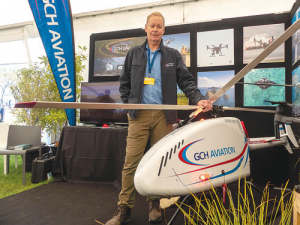Wairarapa’s Bradley Wadsworth blends farming and technology
Bradley Wadsworth lives on the family farm – Omega Station – in the Wairarapa about 30 minutes’ drive east from Masterton.
 GCH Aviation’s Drone Operations manager Rob Duff with the large gas turbine drone the company is trialling for a range of applications including agriculture. Photo: Rural News Group
GCH Aviation’s Drone Operations manager Rob Duff with the large gas turbine drone the company is trialling for a range of applications including agriculture. Photo: Rural News Group
The world may be going all-out on electric vehicles, but GCH Aviation, Christchurch, is trialling a large, gas turbine-powered drone to service farming clients.
GCH (formerly Garden City Helicopters) was showing off a Swiss-made SD50 at last year’s New Zealand Agricultural Show, carrying a $500,000 price tag.
It has two contra-rotating intermeshing rotors so no tail rotor is required. It can fly for 2.5 hours and carry a payload of 40kg. That endurance is a game-changer, claims Darryl Hodgson, general manager of GCH’s UAV (unmanned aerial vehicle) division.
“At the moment, it doesn’t matter what [drone] you’ve got, they’ve all only got a battery life of about 20-30 minutes.”
And the battery life will be even less in a drone that must power, say, a big multi-spectral camera or high-end LIDAR unit. However, uniquely, the SD50 carries its own generator.
GCH Aviation has bases NZ-wide and experience in helicopter and fixed wing services.
It entered the UAV sector in Marlborough about two years ago and now flys electric drones to map farms and vineyards to monitor for pests, diseases and growing stresses such as moisture and nitrogen deficiencies.
At first it met resistance from farmers who had been burned by “backyard guys” who flew off-the-shelf drones and sold the farmers nothing more than “pretty pictures”. Now it can provide collected data and proper analysis of that data.
GCH contracts this part of the service to an experienced US partner company which delivers a report to the farmer in the preferred format. An example is delivering instructions for a GPS-enabled, variable-rate fertiliser or spray application.
The SD 50 can also be configured with a spray boom for use on high-value crops or weed control in areas of poor access, typically where a full-size manned helicopter would not be economically viable.
Hodgson says that while the concept is not new, having a seamless package was preferable to dealing with several providers.
He says the SD50 gas-turbine power unit opens the door to survey a farm of 200ha in one go and at very high accuracy.
Castle Ridge Station has been named the Regional Supreme Winner at the Canterbury Ballance Farm Environment Awards.
The South Island Dairy Event has announced Jessica Findlay as the recipient of the BrightSIDE Scholarship Programme, recognising her commitment to furthering her education and future career in the New Zealand dairy industry.
New Zealand and Chile have signed a new arrangement designed to boost agricultural cooperation and drive sector success.
New DairyNZ research will help farmers mitigate the impacts of heat stress on herds in high-risk regions of the country.
Budou are being picked now in Bridge Pā, the most intense and exciting time of the year for the Greencollar team – and the harvest of the finest eating grapes is weeks earlier than expected.
The Real Estate Institute of New Zealand (REINZ) has released its latest rural property report, providing a detailed view of New Zealand’s rural real estate market for the 12 months ending December 2025.